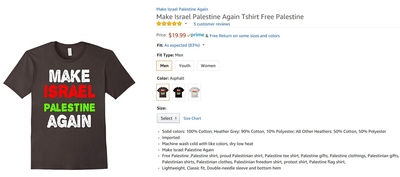 Reader complaints caused Amazon to stop selling a T-shirt that said "Make Israel Palestine Again" after the Investigative Project on Terrorism (IPT) drew attention to it Tuesday.
Reader complaints caused Amazon to stop selling a T-shirt that said "Make Israel Palestine Again" after the Investigative Project on Terrorism (IPT) drew attention to it Tuesday.
The slogan is an indirect call for Israel's elimination and has grown popular on social media sites.
The information outraged many readers. One complained directly to Amazon and said she was assured the T-shirt in question would be removed. The one IPT exposed Tuesday was taken down by late Wednesday evening.
Other T-shirts with the same slogan remained on the site Thursday morning, but they were gone by noon. The items were from a third-party seller using Amazon's "Merch program" that lets people create accounts to sell custom T-shirts, an Amazon spokeswoman told the IPT. There were no indications that the shirts were from third-party vendors Tuesday when the IPT clicked on the "Add to Cart" button.
The page said "Ships from and sold by Amazon.com" without any reference to a third party.
"All Merch by Amazon content creators must follow our content policy and those who do not will be subject to action including potential removal of their account. The product in question is no longer available," the Amazon spokeswoman said.
Amazon's written policies prohibit material that promotes violence, hate or intolerance.
The "Make Israel Palestine Again" slogan has been promoted by proponents of the Boycott, Divestment and Sanctions (BDS) movement that seeks to delegitimize and isolate Israel. A "Make Israel Palestine Again" hat modeled after President Trump's "Make America Great Again" was sold at the booth belonging to the U.S. Campaign for Palestinian Rights (USCPR) last weekend at the left-wing Netroots Nation Conference in New Orleans. USCPR is a major player in the American BDS movement.
"Shame on you @AmazonUK @amazon @AmazonHelp Is hatred what you're selling? Amazon Selling "Make Israel Palestine Again" T-Shirts," Yitzhak Intraif, a self-described Zionist rocker, tweeted.
DianaEE tweeted, "sickening! May have to find an alternative to Amazon!!"
Others called it a "blatant violation of prohibited listing[s]," and Amazon evidently agreed.


